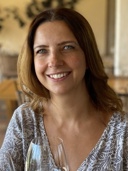
Dr Anna Graham works in Community Sexual and Reproductive Health at King's College Hospital London and has recently returned from Belgrade, Serbia where she spent two years working in refugee camps providing sexual and reproductive health education.
On a freezing December day in a refugee camp on the outskirts of Belgrade, Serbia, I hugged the women in my class, with us bidding fair well and good luck to each other for our very different onward journeys- mine back to London to continue my job as a sexual and reproductive health (SRH) doctor and theirs on the perilous journey across closed borders in an attempt to reach Western Europe.
I had spent the past two years delivering SRH education to female refugees and migrants in transit across the Balkans on their journey to reach the European Union (EU). Serbia is a country in the Western Balkans that borders the EU and since the migrant crisis of 2015 an estimated 1.5 million refugees and migrants have passed through the country.
The EU closed their borders in 2016, making the crossing significantly more difficult, particularly for women with children, leading to large numbers being stuck in transit camps, unable to cross to the EU, while being unable or unwilling to settle in Serbia.
The camp conditions
When I began working in the camp, situated in ex-army barracks, the majority of the women had been living there for over a year. The camp conditions were reasonably good with access to a camp doctor, schools for the children, running water and electricity.
I moved to Serbia for my husband’s job while on maternity leave, and was supported by my training programme and employers to take time out to volunteer in the refugee camps. I was able to use the skills and knowledge I had acquired during my training and from the qualifications I had achieved – a diploma and membership to the Faculty of Sexual and Reproductive Healthcare (FSRH), to provide up to date SRH knowledge.
My experience working in an ethnically and culturally diverse London teaching hospital enabled me to approach this project with cultural awareness and sensitivity.
Where to start
I was working with a non-governmental organisation (NGO) called Sexual and Reproductive Health Serbia, who provided SRH education, advice, advocacy and gynaecology appointments for refugees and migrants.
SRH Serbia had established links within the camp and set up sessions for me to implement SRH education. I began by meeting approximately 10 Farsi speaking women, with a translator. I introduced SRH topics such as menstruation, sexual health, contraception and built rapport with the women. I also collected anonymous questionnaires that identified the SRH needs, desires and demand for SRH education.
The response was overwhelming, all the women attending were interested and wanted to know everything about their bodies. I developed an education programme for the women which was delivered fortnightly in a face to face capacity.
The sessions were tailored to the women’s needs and adapted as necessary. Evaluation of the teaching programme, found that all of the women thought it was useful and reported that their SRH knowledge had increased.
Empowering women
Although difficult to quantify, the increased knowledge hopefully empowered the women to protect themselves from unwanted pregnancy and STIs, to know when to see a doctor, and to request services such as cervical screening.
This project was incredibly rewarding to work upon. The women had diverse backgrounds with varying levels of education, and usually no prior SRH education. It was wonderful to work with them to bust myths and to see their confidence grow when discussing their bodies and sexual health.
Links to publications:
Graham, A. (2021) Sexual and reproductive health education for women in a migrant camp in Belgrade, Serbia, European Journal of Public Health, Volume 31, Issue Supplement_3, October 2021; ckab165.612. Available at: https://doi.org/10.1093/eurpub/ckab165.612
Graham, A. (2021) Digital sexual and reproductive health resources for women living in a migrant camp in Serbia, European Journal of Public Health, Volume 31, Issue Supplement_3, October 2021; ckab165.157. Available at: https://doi.org/10.1093/eurpub/ckab165.157
Further RCOG resources:
To read the RCOG position statement: Equitable access to maternity care for refugee, asylum seeking and undocumented migrant women, click here.
